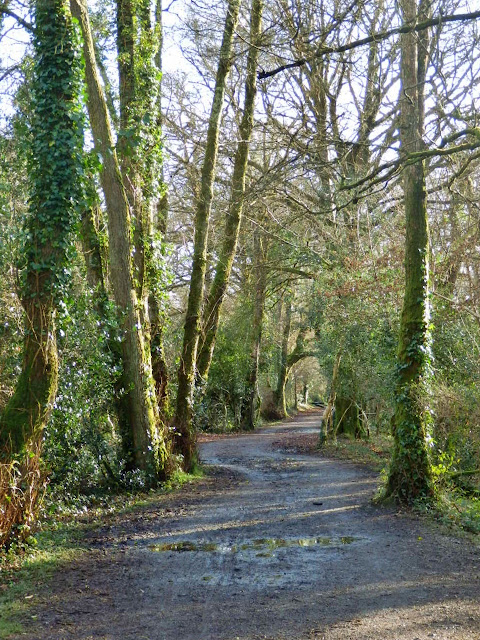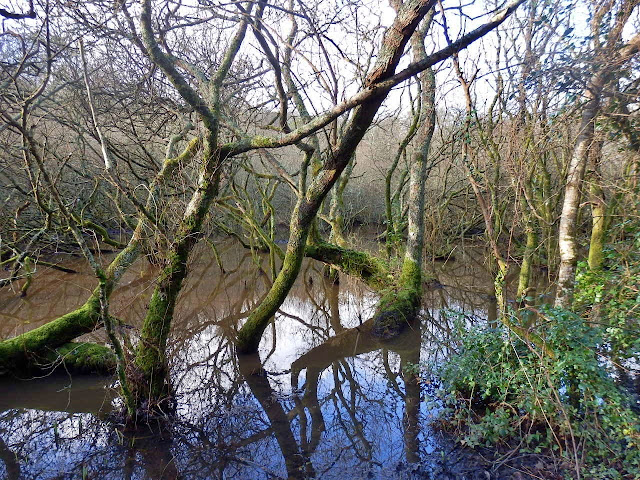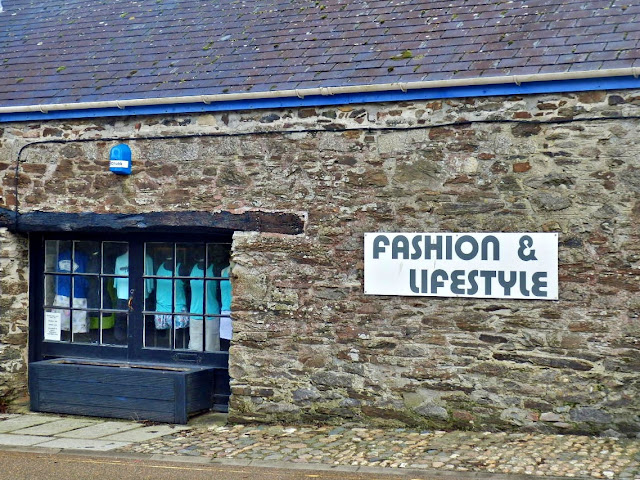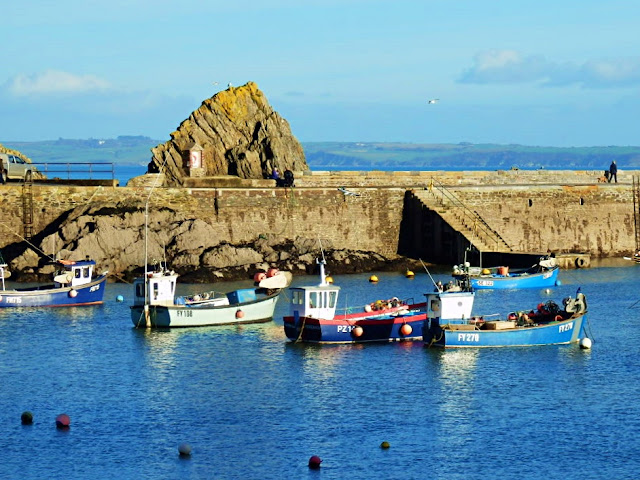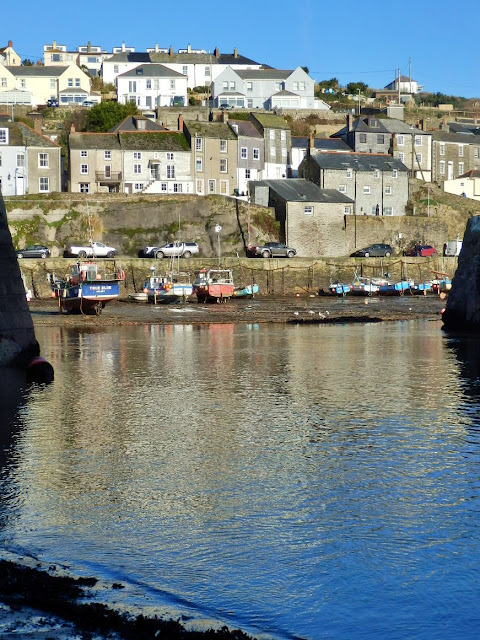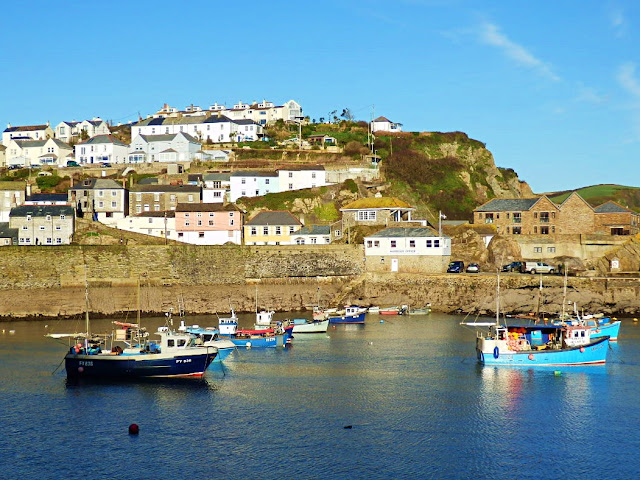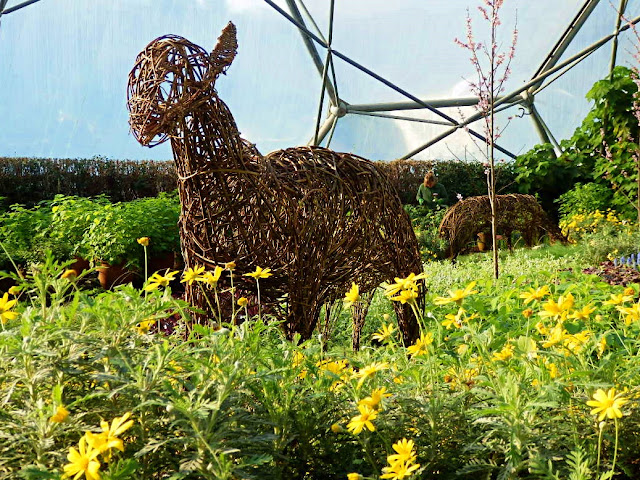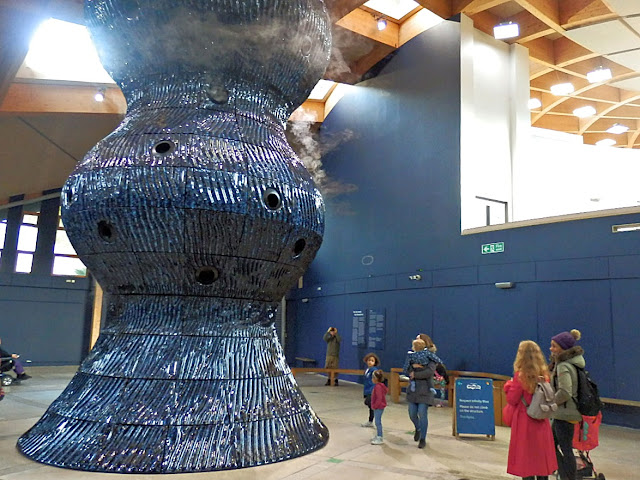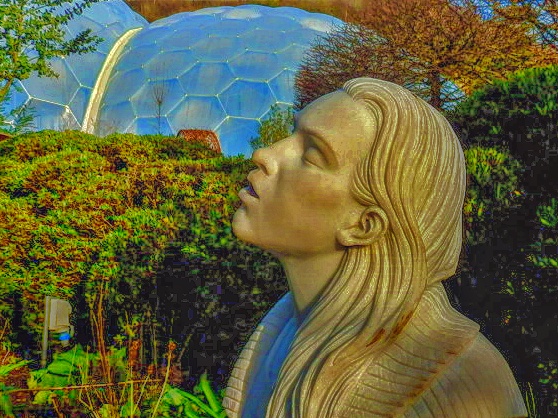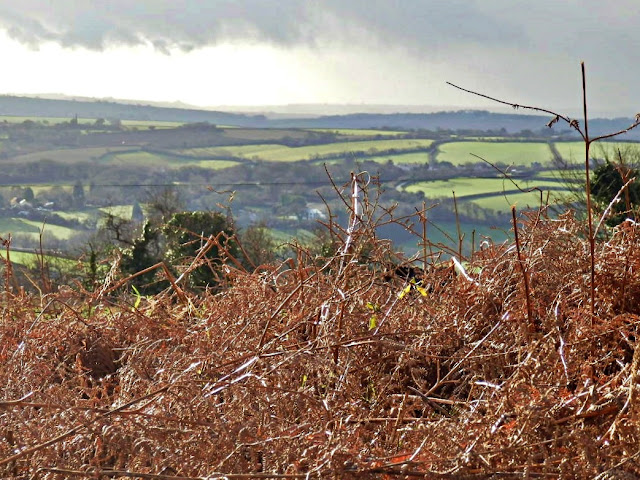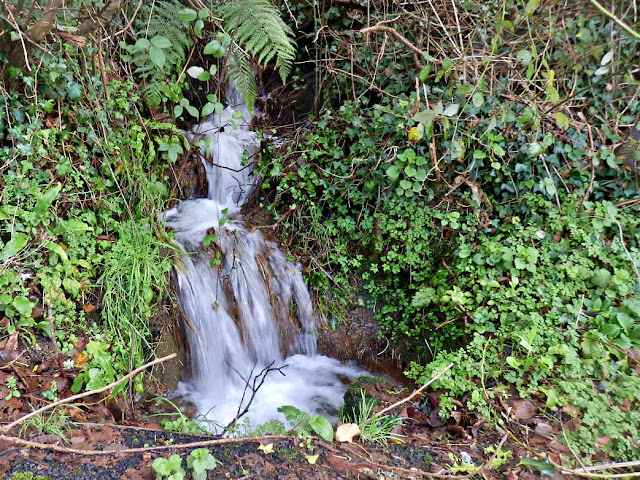Thursday, 16 January 2020
Walking at Pentewan, Cornwall: River, Woods and Trees
On Sunday morning it had been bucketing down. When the rain finally stopped we went for a walk along the footpath to Pentewan, Cornwall and to glimpse the sea before dinner.
A sign post, with a dangling lost mitten, was becoming covered with moss because of all of the recent rain and dampness.
For the first part of the walk the path follows what is known as the St. Austell River. It's proper name is the Vinnick River though, to confuse things, locals often refer to it as the White River as the water is sometimes coloured white by nearby china clay deposits.
After following the river we turned off through the woods.
A few puddles remained from the recent rain, but the path was quite walkable. It is also used by cyclists and the occasional horse rider.
At the side of the path a few smaller trees were swimming in water, though they didn't manage to get very far.
Walking through an arch of trees the sun began to shine - yippee.
Almost to the end of the woods, but first a wooden bridge and a ford used by horses and sometimes cyclists.
More dampness and moss on the trees but we have now virtually reached Pentewan village.
The path opens up to the narrow road leading to the village - and what is the first thing we see? A fashion shop! Being Sunday luckily it was closed.
I'll carry on with the photos, and a glimpse of the sea, in my next post: Pentewan Harbour, Beach and Village, Cornwall
Monday, 13 January 2020
13 Photos of Mevagissey Harbour, Cornwall
After so much rain and greyness the sun finally shone (10th of January) so we headed down to Mevagissey. The tide was out so the Inner Harbour - above - was a jumble of boats.
I snapped a few photos as we walked. The boats were still able to manoeuvre in the outer harbour.
Mevagissey is primarily a fishing village. Years ago the boats would catch pilchards, but the demand gradually decreased. The pilchards were then rebranded as Cornish Sardines - and the sales increased! What a difference a name can make.
Looking east from the harbour wall shows the rugged coastline.
Two girls were out at sea on their paddle boards. The sea was so blue, calm and perfect. As I have no doubt said before, the sea around Cornwall has many colours and shades dependent on the weather conditions.
Along the wall that divides the inner and outer harbours are some of the paraphernalia for the fishing boats. The public aren't allowed along this walkway for safety reasons.
Not sure if She Sells sells sea shells but you'll find the shop by the harbour.
Looking out to the entrance of the outer harbour. Hard to believe this is January.
A few fishing boats and one of the harbour walls. Always interesting to walk along the wall unless, of course, the weather isn't too good.
A further stretch of the walkable harbour wall.
Below is the entrance to Mevagissey's inner harbour - used when the water has risen to a suitable level.
Houses overlooking the harbour. Many are now holiday or second homes. This has pushed the prices up and up. So much so that it is now difficult for locals to afford them, especially the young looking for their first home. Many have to move away. This effects the dynamics of the whole village: the shops, pubs, businesses and the community.
There's a range of small shops (and pubs & restaurants) in the village but many are aimed at the visitors who flood Mevagissey in the main summer months.
Here are three more Mevagissey posts with lots of photos:
An Introduction to Mevagissey, Cornwall The Two Saint Village
Mevagissey The Two Saint Village and Harbour - 10 Photos
Mevagissey, Cornwall - Where It's A Good Job That Cows Can't Fly!
Friday, 10 January 2020
Cornwall's Eden Project and its Varying Art Work
Today a different look at Cornwall's Eden Project. Instead of the usual plants and flowers we look a few of Eden's art work.
Above is a marble statue, which is also a water fountain. The work was created by Ryan Gander and is fabricated in the likeness of his wife, Rebecca, who playfully spits water!
In the outer regions of Eden is the gentleman below - not exactly sure what he signifies.
Moving on to the Mediterranean Biome we find Gaia, an illuminated globe by Luke Jerram.
The globe is seven metres in diameter and has NASA detailed imagery of the Earth's surface - as it would be viewed from space.
The bird below was happily amusing himself on cacti plants.
Oh, and this wicker animal was also frolicking happily in the Mediterranean Biome - well he would be if he could.
Moving on to Eden's Core building we find Infinity Blue.
It is believed that Infinity Blue is the world's biggest ceramic sculpture. It weighs in at 20 tonne and is said to pay homage to cyanobacteria, one of the world's smallest living beings.
The structure is around nine metres tall and fires out vapour rings spasmodically from it's 32 'cannons'.
This is popular with children as they enjoy trying to catch the vapour rings before they disappear. Okay, I do too!
Moving on, there is art work around the gardens in varying forms.
Finally for this post we come across artwork called Crowd 4 designed by Julian Opie. I don't really get this, but it is described as a monolith sculpture with animation played on a double sided LED screen.
The film features a number of people crossing the screen, thus creating a monument to crowd or flock.
So there you are - various art at Cornwall's Eden Project.
All this art work, so I thought I'd give Rebecca a bit of colour instead of her marble whiteness.
More Posts on the Eden Project:
Cornwall's Eden Project With The world's Largest Indoor Rainforest - Plus Much More
A Flavour Of Cornwall's Eden Project: 15 Photos
More Flavour of Cornwall's Eden Project - 14 Photos
Tuesday, 7 January 2020
Walking The Cornish Lanes Looking for January Flowers and Other Things of Interest
'Twas a dull morning, a little drizzly, but I always feel I need a walk so we decided to head for the lanes near Trenance, St.Austell. There's rarely any traffic and perhaps I would see some colour in the hedgerows.
Well I did find some flowers as can be seen by my photo above. Yes, they are daffodils - very early, even for Cornwall.
It sure looked like rain!
Gradually the greyness lifted and it was possible to look across the fields. The view would have been a better if the hedgerows weren't quite so high.
Yes, the grey must have been frightened away as the sky turned blue. There's a wind turbine in the distance.
This is/was china clay country as can be seen below. The hill is made from the spoils of the china clay industry. Nature has taken over and made the scene quite pleasant.
It started getting dull again. That's Cornwall for you, travel a short distance and the weather can be quite different.
Water was gushing onto the road from the recent heavy rain ...
… and joined a small river ...
… which gradually became wider.
We then came to the bridge across the Trenance Road built in 1859.
Actually there are two bridges as can be seen in the photo below. The second bridge was built in 1899.
Trains thunder across the Gover Valley via the bridge and also a viaduct. This is used by trains travelling from London Paddington to Penzance and vice versa.
From here we followed a footpath to take us down to the valley.
Looking south are houses and the block of flats - the only high rise flats in Cornwall - I mentioned in a previous post.
That's it for today - keep on walking!
See also:
33 Photos: A Circular Walk Based On Gover Valley, St.Austell, Cornwall
Subscribe to:
Comments (Atom)
FEATURED POST
Cornwall's Lizard Peninsula
I know my wife and I and live in Cornwall but we had a break away from home on Cornwall's L izard Peninsula - one of our favourit...






